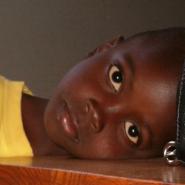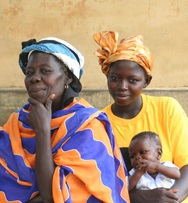 The Rights of Man reach an Ivorian village
The Rights of Man reach an Ivorian village
How can people come to see as a problem those parts of their own traditions which trample on human rights? An appeal to something more important than cultural or religious tradition is a revolutionary idea. This account captures people's excitement on first hearing about human rights. The women of the Côte d'Ivoire today show what it must have felt like to people in Europe two centuries ago, as they made the thrilling discovery: "We have rights, too!"
 It’s called the International Rescue Committee because it was founded to help Jews escape from Hitler. Today this human rights organisation is active in many countries,. These include the Côte d’Ivoire which in 2007 was coping with the aftermath of civil war, but enjoying an interlude of peace.
It’s called the International Rescue Committee because it was founded to help Jews escape from Hitler. Today this human rights organisation is active in many countries,. These include the Côte d’Ivoire which in 2007 was coping with the aftermath of civil war, but enjoying an interlude of peace.
Part of the IRC's job is to spread knowledge of human rights, in rural areas like the district of Yamoussoukro. The adjoining city of the same name boasts a huge Catholic basilica even larger than St. Peter's in Rome,. This building even has its own concordat to ensure support by the Ivorian taxpayers. Yet, though the citizens of Côte d'Ivoire subsidise both the state and the Catholic Church, neither the government nor the Vatican have included in their educational offerings the concept of human rights.
That was left to a secular charity, the IRC, which in 2007 called a meeting of tribal chiefs. There an IRC worker tried to get them to recognise their traditions as a problem by asking them pointedly about the "forms of violence that are part of women's daily lives".
The chiefs in their colourful robes and black pillbox hats studded with gold sit there and think critically for the first time about this accepted situation. Finally they come up with a list of "women's problems":
battering,
rape,
forced marriage,
inadequate health care
and FGM. [1]
And that's only in peacetime. In war it’s worse — far worse. [2] As the IRC worker notes, "Using women as a tactic of war or a piece of the spoils, is only to be expected from men already in the habit of thinking of women as 'things' ".
The solution begins with an explanation of human rights. In Africa, as in Europe two centuries ago, introducing that revolutionary idea is necessary for change. Here is a wonderful account of how the IRC workers, working in an Ivorian village, accomplished this task with consummate tact. [3]
“Men lie!” the old woman says. The men at the meeting laugh. The stony-faced village Chief cracks a smile. But the women aren’t laughing. They support the old woman’s objection to their exclusive meeting being translated by a man. I’m reminded of Afghan women who told me they want to learn to read so they can see if the Koran really says what mullahs and husbands say it does. Here in Côte d’Ivoire, a world away from Afghanistan, I find the same suspicion among women that they’re being conned. [...]
The man offers to give way to a woman. That’s when we learn what he must already know: that among the forty or fifty women crowded onto the steps of the chief's reception house, there is not a single one who speaks French.
Among Côte d’Ivoire’s population of more than sixty different tribes and tongues, French long ago became the common language of commerce and politics. Even in rural villages, many men speak French. The fact that women do not reflects their long exclusion from public life. And it means that all the information they get, including what they need to know to make sound decisions about such personal matters as their own health and reproduction and the wellbeing of their children, comes to them from the mouths of men.
Women have been bamboozled, and they know it.
 Take human rights, for example. In French that’s "les droits de l'Homme" — the rights of man. Spelled with a capital H, the word Homme is meant to include both genders; but when the phrase is spoken, the capital letter conveniently disappears. Men produce a literal translation. The IRC field agents [...] astonished villagers with the news that "Homme" in that phrase about droits includes "femme" too.
Take human rights, for example. In French that’s "les droits de l'Homme" — the rights of man. Spelled with a capital H, the word Homme is meant to include both genders; but when the phrase is spoken, the capital letter conveniently disappears. Men produce a literal translation. The IRC field agents [...] astonished villagers with the news that "Homme" in that phrase about droits includes "femme" too.
Les droits de la femme? Impossible! Even women think "the rights of woman" were invented by the IRC. But they like the idea. Les droits humaine.
Notes
International Rescue Committee (IRC), "Ann Jones in Cote d'Ivoire: Archive". http://www.rescue.org/ann-jones-cote-divoire-archive
1. Ann Jones, 16 Days - Day 5 : "Sensibilisation", posted 29 November 2007. http://www.rescue.org/blog/16-days-day-5-%E2%80%9Csensibilisation%E2%80%9D
2. Ann Jones, 16 Days - Day 4 : Targeting Women, posted 28 November 2007. http://diy.rescue.org/blog/16-days-day-4-targeting-women
3. Ann Jones, 16 Days - Day 6 : Les Droits de l’Homme, posted 30 November 2007. http://diy.rescue.org/blog/16-days-day-6-les-droits-de-l%E2%80%99homme








